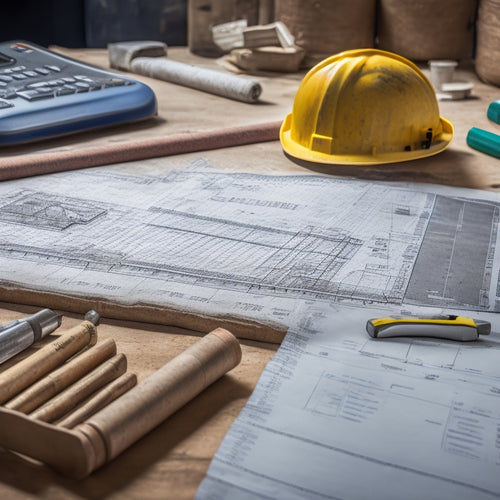
10 Best Measuring Tools for Concrete Construction
Share
When building concrete structures, you need the right measuring tools to guarantee accuracy and precision. Laser levels and rotary laser levels provide accurate grading and leveling, while digital calipers and concrete depth measuring devices assure precise measurements. Long tape measures and measuring wheels help with site layout and distance tracking, and high-accuracy inclinometers measure slopes with ease. Ultrasonic distance meters and measuring rods are essential for wall thickness and foundation work. With these top measuring tools, you'll be able to construct concrete structures with confidence, and by exploring them further, you'll uncover the secrets to achieving perfect precision and accuracy in your projects.
Key Takeaways
• Laser levels are essential for accurate grading and establishing reference points in concrete construction, ensuring precise projections and self-leveling features.
• Digital calipers provide high-precision readings for measuring concrete elements, such as rebar diameter and slab width, ensuring quality control and material inspection.
• Angle measuring tools, including digital angle finders and laser angle measuring tools, are critical for maintaining structural integrity and aesthetic alignment in concrete construction.
• High-accuracy inclinometers are necessary for measuring slopes to ensure structural integrity, with precision ranges of up to ±0.01° and full 360° range capabilities.
• Calibration and verification of measuring tools are crucial to guarantee reliable measurements, ensure compliance with industry standards, and reduce errors in critical applications.
Laser Levels for Accurate Grading
When constructing concrete foundations, roads, or buildings, you rely on laser levels to guarantee accurate grading, as they provide a precise reference point for establishing and checking elevations.
These instruments have undergone significant laser technology advancements, enabling them to project a level line or plane with utmost accuracy.
In contrast to traditional leveling techniques, such as spirit levels and optical levels, laser levels offer faster and more reliable results. A comparison of leveling techniques reveals that laser levels are more efficient, especially in large-scale projects or when working with complex layouts.
Their self-leveling capabilities and automatic compensation for minor deviations make certain that you can trust the readings.
Additionally, modern laser levels often come equipped with advanced features like Bluetooth connectivity, allowing for seamless data transfer and increased productivity.
Digital Calipers for Precise Measurements
With precision being paramount in concrete construction, you'll find digital calipers to be an indispensable tool for taking accurate measurements of concrete elements, from rebar to finished surfaces. These instruments offer a range of digital caliper advantages, including high-precision readings, ease of use, and rapid measurement capabilities. As a result, digital calipers have become a staple in concrete construction, with applications spanning from quality control to material inspection.
When it comes to digital caliper applications, the possibilities are vast. You can use them to measure the diameter of rebar, the width of concrete slabs, or the thickness of walls. Digital calipers can also help you verify the accuracy of poured concrete, confirming that it meets the required specifications.
Furthermore, they can be used to inspect materials, such as measuring the thickness of aggregate or the diameter of anchor bolts. With their high level of precision and versatility, digital calipers are an essential tool for any concrete construction project.
Concrete Depth Measuring Devices
You'll often need to measure the depth of concrete to confirm it meets specifications, and concrete depth measuring devices provide an efficient way to do so. These devices are specifically designed to measure the depth of freshly poured or existing concrete.
A common type of concrete depth measuring device is a depth gauge, which typically consists of a probe and a measuring scale. You'll insert the probe into the concrete, and the scale will indicate the depth. This method is suitable for measuring depths up to several inches.
For more accurate and detailed measurements, you may need to use concrete coring. This involves drilling a core sample from the concrete, which can then be analyzed to determine its depth and other properties.
Concrete coring is often used for quality control and assurance purposes, as it provides a precise and reliable measurement of the concrete's depth and composition.
Long Tape Measures for Site Layout
Accurate site layout is crucial in concrete construction, and long tape measures are essential tools for achieving it. You need to guarantee that your site measurement techniques are precise, and that's where long tape measures come in. These tools allow you to measure vast areas quickly and efficiently, making them a staple in any concrete construction project.
When choosing a long tape measure, consider the following factors to guarantee tape measure accuracy:
-
Length: Look for tapes that can extend up to 100 feet or more to cover large areas.
-
Material: Fiberglass or nylon-coated tapes are more durable and resistant to wear and tear.
-
Accuracy: Opt for tapes with a high level of accuracy, typically ±1/16 inch or better.
- Ergonomics: Choose tapes with comfortable grips and easy-to-read markings to reduce fatigue and errors.
Rotary Laser Levels for Grading
Set up your rotary laser level to guarantee precise grading, as this tool enables you to establish a reference plane for site excavation and concrete pours. With a rotary laser level, you can achieve accurate grading by projecting a 360-degree laser plane, making certain that your site is leveled to perfection. This tool is especially useful for large-scale projects where minor deviations can lead to significant errors.
Here's a breakdown of the rotary level benefits for grading accuracy:
| Feature | Benefit | Impact on Grading Accuracy |
|---|---|---|
| Self-leveling | Guarantees accuracy in uneven terrain | ±1.5mm accuracy |
| High-visibility laser | Enhances visibility in bright conditions | Improved accuracy in outdoor settings |
| Automatic slope matching | Simplifies slope calculation | ±0.1° accuracy |
| Wireless remote control | Enables convenient adjustments | Reduced setup time |
| Long-range operation | Covers large areas with ease | Increased efficiency |
Angle Measuring Tools for Corners
When constructing corners in concrete projects, precise angle measurements are essential to ascertain structural integrity and aesthetic appeal, and that's where angle measuring tools come into play.
You can't afford to compromise on corner alignment, as it affects the overall structure's stability and visual appeal. To guarantee angle accuracy, you'll need reliable tools that provide precise readings.
Here are some essential angle measuring tools for corners:
-
Digital Angle Finders: These handheld devices use sensors to detect angles, providing accurate readings within seconds.
-
Protractors with Vernier Scales: These precision instruments allow you to measure angles with high accuracy, ideal for complex corner designs.
-
Laser Angle Measuring Tools: These advanced tools project a laser line, enabling you to measure angles quickly and accurately, even in tight spaces.
- Angle Encoders: These electronic devices measure angles with high precision, often used in conjunction with other tools for added accuracy.
High-Accuracy Inclinometers for Slopes
You'll need high-accuracy inclinometers to measure slopes in concrete construction, as even slight variations in inclination can considerably impact the structural integrity and overall performance of the project. Inclinometers help guarantee slope stability by providing precise angle measurements, which are critical in preventing structural failures and guaranteeing the safety of buildings and infrastructure.
When selecting an inclinometer, consider the following factors:
| Inclinometer Type | Measurement Range | Accuracy |
|---|---|---|
| Tilt sensor | ±15° | ±0.1° |
| Digital inclinometer | ±90° | ±0.01° |
| Precision inclinometer | ±360° | ±0.001° |
| High-precision inclinometer | ±360° | ±0.0001° |
Before using an inclinometer, make certain to calibrate it according to the manufacturer's instructions to guarantee accurate readings. Regular calibration checks are also essential to maintain the inclinometer's accuracy and reliability. By using a high-accuracy inclinometer and following proper calibration procedures, you can guarantee accurate slope measurements and maintain the structural integrity of your concrete construction project.
Measuring Wheels for Distance Tracking
Measuring wheels play an essential role in concrete construction by allowing you to accurately track distances, guaranteeing precise layout and alignment of structures, and facilitating efficient project management.
As you navigate complex construction sites, these tools provide reliable distance measurement techniques that help you stay on track.
When selecting a measuring wheel, you should prioritize accuracy above all else. Look for wheels with high-resolution counters and precise circumference calculations.
Here are some key factors to take into account:
-
Wheel size and material: Larger wheels with durable materials can handle rough terrain and heavy use.
-
Counter resolution: High-resolution counters guarantee accurate distance measurements, even at high speeds.
-
Circumference calculation: Precise calculations eliminate errors and guarantee reliable distance tracking.
- Ergonomic design: Comfortable grips and adjustable handles reduce fatigue and improve usability.
Ultrasonic Distance Meters for Walls
When you're working with ultrasonic distance meters for walls, you'll appreciate the accuracy they bring to measuring wall thickness.
You can obtain precise readings without damaging the surface, thanks to the non-invasive measurement methods these tools employ.
Accurate Wall Thickness
By utilizing ultrasonic distance meters, concrete construction professionals can determine the accurate wall thickness, guaranteeing compliance with building codes and specifications. This is vital, as wall thickness measurement techniques play a critical role in maintaining ideal wall thickness standards.
When it comes to accurate wall thickness, you need to take into account the following key factors:
-
Material density: Ultrasonic distance meters can accurately measure wall thickness by detecting the density of the concrete material.
-
Surface roughness: The device can account for surface roughness, making sure that the measurement isn't affected by minor imperfections.
-
Temperature and humidity: Environmental factors can impact measurement accuracy, but advanced ultrasonic distance meters can compensate for these variations.
- Calibration and verification: Regular calibration and verification of the device guarantee that the measurements are reliable and accurate.
Non-Invasive Measurement Methods
You can rely on non-invasive ultrasonic distance meters to accurately determine wall thickness without damaging the concrete structure or disrupting the construction process. These meters use high-frequency sound waves to measure the distance between the device and the target surface, providing precise measurements without physical contact. This non-invasive technology guarantees measurement accuracy, eliminating the risk of damaging the concrete or compromising its structural integrity.
When selecting an ultrasonic distance meter, look for devices with high-frequency transducers (typically above 50 kHz) and advanced signal processing algorithms. These features enable accurate measurements even in noisy environments or with varying surface roughness. Additionally, consider meters with adjustable gain and threshold settings to adapt to different concrete types and surface conditions.
Non-invasive technologies like ultrasonic distance meters offer significant advantages in concrete construction. They enable you to verify wall thickness without drilling or coring, reducing labor costs and minimizing waste. By guaranteeing measurement accuracy, you can confidently identify potential issues early on, preventing costly rework and ensuring the structural integrity of your concrete projects.
Measuring Rods for Foundation Work
When measuring foundation work, you need to verify you're getting accurate depth readings to avoid costly mistakes.
That's why you should consider using measuring rods that can provide reliable data, even in harsh environments.
As you choose a measuring rod, you'll want to prioritize rod material durability to assure consistent results.
Accurate Depth Readings
Achieving accurate depth readings is crucial in foundation work, as it directly impacts the structural integrity of the building. Measuring rods are essential tools for obtaining these readings. When it comes to concrete construction, you need to guarantee that the concrete thickness meets the required standards. Measuring rods help you accomplish this by providing precise depth measurements.
To guarantee accurate depth readings, you should:
-
Choose the right measuring rod: Select a rod that's suitable for the specific foundation work, taking into account factors such as the type of concrete, its density, and the environmental conditions.
-
Use the correct depth measurement techniques: Familiarize yourself with established techniques, such as the 'direct measurement method' or 'indirect measurement method', to guarantee consistency and accuracy.
-
Calibrate your measuring rod regularly: Regular calibration guarantees that your measurements are accurate and reliable, reducing the risk of errors.
- Verify your measurements: Double-check your readings to guarantee they meet the required concrete thickness standards, and make adjustments as needed.
Rod Material Durability
Measuring rods for foundation work are exposed to harsh environmental conditions and physical stress, which demands that their material durability is capable of withstanding these challenges to guarantee accurate and reliable depth readings.
As you select a measuring rod, you'll want to take into account the material's resistance to corrosion, abrasion, and impact. A rod made from high-quality, durable materials will secure rod longevity and maintain its accuracy over time.
When evaluating rod material durability, look for rods constructed from materials like fiberglass, stainless steel, or anodized aluminum. These materials offer excellent resistance to corrosion and wear, ensuring your rod remains reliable even in the toughest conditions.
Additionally, take into account rods with a durable coating or finish that can withstand exposure to moisture, chemicals, and extreme temperatures.
Frequently Asked Questions
How Often Should I Calibrate My Digital Calipers for Accurate Readings?
You should calibrate your digital calipers regularly to guarantee accurate readings. The calibration frequency depends on usage and environmental factors.
If you're using them daily, calibrate every 1-3 months. For moderate use, calibrate every 6-12 months.
Proper digital tool maintenance is essential to prevent measurement drift.
Refer to the manufacturer's guidelines for specific calibration procedures to maintain precision and reliability in your measurements.
Can I Use a Rotary Laser Level for Indoor Construction Projects?
When you're tackling indoor construction projects, you'll find that a rotary laser level is an invaluable tool.
You'll reap the rotary laser benefits, including increased accuracy and efficiency, as it projects a 360-degree plane of light, ensuring levelness and plumbness.
Its indoor project applications are vast, from setting elevations to installing drywall, and it's particularly useful in areas with limited access or obstructions, making it an essential addition to your toolkit.
What Is the Maximum Distance an Ultrasonic Distance Meter Can Measure?
You're pushing the limits of precision, and you want to know how far an ultrasonic distance meter can stretch.
The answer lies in its ultrasonic range, which typically spans from 0.1 meters to 100 meters.
When it comes to distance measurement, these meters use high-frequency sound waves to calculate the time-of-flight, providing accurate readings up to the maximum distance.
You'll find top-tier models can hit distances of 200 meters or more, but be prepared for varying degrees of accuracy depending on the environment.
Are Measuring Wheels Accurate on Uneven or Rough Terrain?
When you're working on uneven terrain, you'll face challenges that affect measuring wheel accuracy.
You'll encounter issues like wheel slippage, vibration, and inconsistent contact, which can lead to inaccurate readings.
To minimize these effects, look for measuring wheels with features like large, ruggedized wheels, adjustable tension, and shock-absorbing designs.
Can I Use a Concrete Depth Measuring Device for Other Materials?
You're wondering if a concrete depth measuring device is a one-trick pony, only suitable for concrete thickness measurements.
Think of it like a Swiss Army knife - it may have been designed for one task, but its material versatility allows it to adapt to other materials with ease.
In reality, many concrete depth measuring devices can accurately measure the thickness of other materials, such as asphalt, drywall, or even wood.
Conclusion
With these top-tier tools in your toolkit, you'll be tackling tough concrete construction tasks with tremendous traction.
From laser levels that lay down precise planes to measuring wheels that map out massive distances, each device is designed to deliver dependable data and dodge deadly errors.
By deploying these dynamite devices, you'll dodge delays, slash setbacks, and drive your concrete construction projects to dazzling completion.
Related Posts
-

10 Must-Have Tools for Small Concrete Projects
When tackling small concrete projects, you'll need a range of essential tools to achieve professional-grade results. ...
-

5 Tips for Accurate Concrete Measurement Tools
To guarantee accurate concrete measurement, you'll want to calibrate your measuring tools regularly, choosing a frequ...
-

What Tools Are Needed for Concrete Wall Foundations
You'll need a thorough array of tools and equipment to construct a concrete wall foundation that meets structural int...


